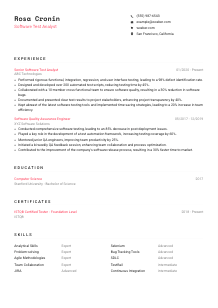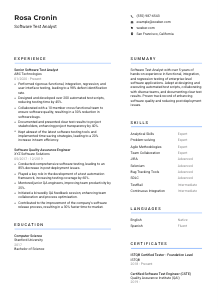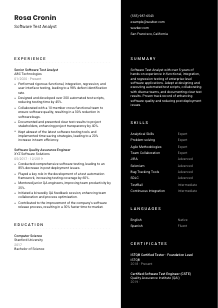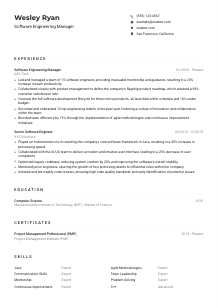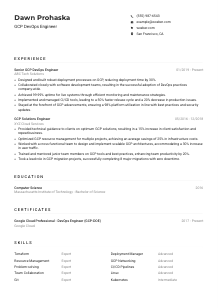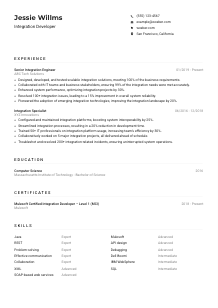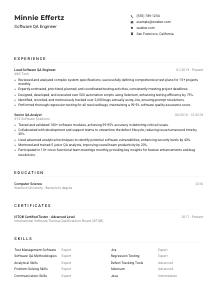Software Test Analyst Resume Example
Debugging code, but your resume doesn't compile? Dive into this Software Test Analyst resume example, streamlined with Wozber free resume builder. It demonstrates how to showcase your testing expertise in line with job expectations, ensuring your career path is always glitch-free!
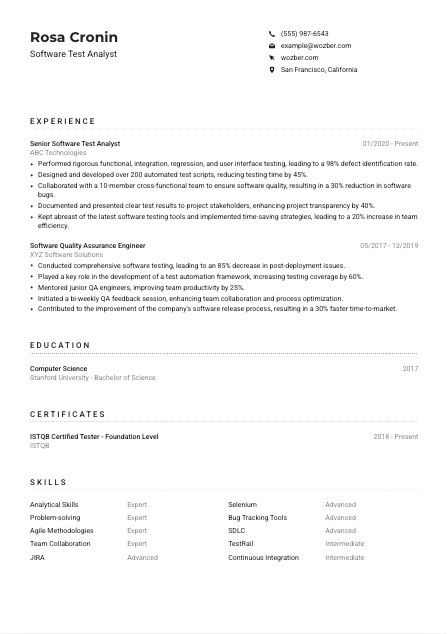
How to write a Software Test Analyst resume?
Greetings, aspiring Software Test Analyst! In the realm of software development, your role is crucial in ensuring applications run smoothly and efficiently. But before you can showcase your skills in the workplace, you need to navigate the challenge of landing your dream job. That's where a standout resume comes into play.
Give your career the ‘green light' by crafting a resume that not only meets but exceeds job expectations. With the help of Wozber's free resume builder, this guide will provide you with step-by-step tips to construct an ATS-compliant resume tailored to the Software Test Analyst position. Let's transform your resume into an unbeatable candidate profile!
Personal Details
As the gateway to your resume, the Personal Details section must be concise yet compelling. Let's optimize this area to ensure it ticks all the boxes for a Software Test Analyst's position, aligning it perfectly with job requirements.
1. Present Yourself Professionally
Start by clearly showcasing your name. Use a readable font at a size that makes your name prominent, setting a professional tone right from the start.
2. Align with Your Desired Role
Next, align yourself with the role by including "Software Test Analyst" right below your name. This immediate alignment with the job title signals to the hiring manager that your application is directly relevant.
3. Essential Contact Information
- Phone Number: Accuracy is key. Ensure your contact number is current and without typos, maintaining a straightforward path for potential employers to reach you.
- Professional Email Address: Your email should reflect professionalism. A format incorporating your first and last name is typically fail-safe.
4. Confirm Your Location
Given the job's location requirement of San Francisco, California, make sure to include this in your resume. This fulfills a vital criterion, showing you either reside in or are willing to relocate to the specified location.
5. Professional Website or LinkedIn Profile
If applicable, weaving in a link to a professional portfolio or an up-to-date LinkedIn account can further bolster your credentials by providing a deeper insight into your professional journey.
Takeaway
The Personal Details section serves as the initial handshake with your potential employer. It's crucial to keep it professional, accurate, and aligned with the specific Software Test Analyst role you are targeting. A well-constructed introduction sets the stage for a compelling resume. Let it reflect your professionalism and readiness for the job.





Experience
The Experience section is where you shine. It's your opportunity to depict how your previous roles have prepared you for the responsibilities of a Software Test Analyst. Let's delve into how to curate your past experiences, making them resonate with the job description provided by Wozber's ATS-friendly resume template.
- Performed rigorous functional, integration, regression, and user interface testing, leading to a 98% defect identification rate.
- Designed and developed over 200 automated test scripts, reducing testing time by 45%.
- Collaborated with a 10‑member cross‑functional team to ensure software quality, resulting in a 30% reduction in software bugs.
- Documented and presented clear test results to project stakeholders, enhancing project transparency by 40%.
- Kept abreast of the latest software testing tools and implemented time‑saving strategies, leading to a 20% increase in team efficiency.
- Conducted comprehensive software testing, leading to an 85% decrease in post‑deployment issues.
- Played a key role in the development of a test automation framework, increasing testing coverage by 60%.
- Mentored junior QA engineers, improving team productivity by 25%.
- Initiated a bi‑weekly QA feedback session, enhancing team collaboration and process optimization.
- Contributed to the improvement of the company's software release process, resulting in a 30% faster time‑to‑market.
1. Dissecting the Job Requisites
Kick off by reviewing the job description closely, identifying keywords and phrases related to software testing roles. Look for specifics like "automated test scripts," "functional testing," and "software quality assurance." Embed these into your accomplishments.
2. Present Clearly
Structure your experience in reverse chronological order. Lead with your most recent role, including your position, company name, and tenure.
3. Craft Compelling Accomplishments
Draw connections between your responsibilities and the job listing. Incorporate accomplishments like "Designed and developed over 200 automated test scripts, reducing testing time by 45%." This demonstrates both your expertise and your impact.
4. Quantify Your Success
Numbers speak volumes. Use them to quantify your achievements, giving a tangible measure of your efficiency and effectiveness.
5. Relevance is Key
Focus on the experience that best matches the Software Test Analyst's responsibilities. This might mean prioritizing roles where you led testing efforts or improved software quality through meticulous QA processes.
Takeaway
Your Experience section is your storytelling platform - it's where you illustrate your journey and your potential. By aligning your past roles with the responsibilities and qualifications of the Software Test Analyst position, you show the hiring manager not just where you've been, but where you can go within their organization.
Education
Education forms the bedrock of your technical expertise, especially in a field as specialized as software testing. Let's navigate through optimizing this section to align with the Software Test Analyst position, emphasizing your educational achievements using the ATS-friendly resume format.
1. Identifying Key Educational Requirements
Reflect on the job's call for a "Bachelor's degree in Computer Science, Engineering, or a related technical field." Ensure your degree is front and center, making it instantly evident that you meet this fundamental criterion.
2. Simplifying the Structure
Maintain clarity by listing your educational background using a straightforward format: degree, field of study, institution, and graduation date.
3. Customize Your Degree Details
If you hold the exact degree mentioned in the job listing, spotlight it. For instance, noting your "Bachelor of Science in Computer Science" directly correlates with the specified educational requirement.
4. Mentioning Relevant Courses
Where applicable, highlight specific courses or projects related to software testing. This can add depth to your educational credentials, illustrating direct relevance to the job role.
5. Other Noteworthy Achievements
Include any honors, clubs, or extra-curricular activities related to your field that might bolster your application, particularly if they demonstrate skills or interests that align with the Software Test Analyst position.
Takeaway
Your education is a testament to your commitment to your field. By tailoring this section to match the requirements of the Software Test Analyst role, you showcase not just your qualifications, but also your dedication to pursuing excellence in software testing.
Certificates
In a detail-oriented profession like software testing, certifications can significantly bolster your credentials. They provide tangible proof of your skills and dedication to continuous improvement. Let's explore how to effectively present your certifications, ensuring they resonate with the Software Test Analyst role.
1. Extracting Job-Specific Certifications
Pinpoint certifications exact to the job description. For this role, highlighting certifications like "ISTQB Certified Tester - Foundation Level" and "Certified Software Test Engineer (CSTE)" underscores your specialized knowledge and preparedness.
2. Prioritizing Relevant Certifications
Select certifications most pertinent to the Software Test Analyst position. This ensures that recruiters immediately see your most relevant qualifications.
3. Clarity with Dates
Where applicable, include the dates of your certifications to showcase their current relevance and your initiative in staying updated in your field.
4. Commit to Continuous Learning
Emphasize your commitment to ongoing professional development. This adaptability is crucial in a fast-evolving field like software testing.
Takeaway
Your certifications are a key asset, proving your readiness and enthusiasm for the Software Test Analyst role. By presenting them effectively, you're not only aligning with the job requirements but also illustrating your motivation to remain at the forefront of your profession.
Skills
The Skills section is a powerful part of your resume, acting as a quick reference that showcases your capabilities at a glance. Here's how to craft a Skills list that speaks volumes to hiring managers looking for a top-tier Software Test Analyst.
1. Understanding the Role's Demands
Begin with a thorough analysis of the job description. Identify both hard and soft skills that are directly mentioned or implied, such as "Analytical Skills," "Problem-solving," and "Team Collaboration."
2. Aligning with Job Needs
Prioritize skills that match the job listing, ensuring that your proficiency in areas like "JIRA," "Selenium," and "Automated Test Scripts" is clear. This direct alignment makes your fit for the role unmistakable.
3. Organizing for Impact
Rather than listing every skill you have, curate a focused list that speaks directly to the needs of a Software Test Analyst. This organized approach ensures that hiring managers quickly see how well you match the role's requirements.
Takeaway
The Skills section is more than a list; it's a curated exhibit of your professional arsenal. Tailor this section using a clear, focused strategy that highlights your match for the Software Test Analyst position. Let it be clear evidence of why you're the best candidate for the job.
Languages
In today's globalized work environment, being multilingual can be a significant asset, even in technical fields like Software Testing. Crafting the Languages section with care can further distinguish your resume. Let's pinpoint how you can leverage your linguistic abilities for the Software Test Analyst role.
1. Pinpointing Job Language Requirements
Ensure you clearly list English proficiency since the job specifies a need for linguistic adeptness in English. This addresses a direct requirement from the hiring team.
2. Prioritizing Job-Specific Languages
Highlighting your proficiency level in English should take precedence. If you know additional languages, list them next to showcase your broader communication skills, but English should be your focus in alignment with the job dictates.
3. Showcasing Additional Languages
For roles with a lesser emphasis on language skills, displaying proficiency in languages beyond the job requirements can depict you as a versatile and adaptable candidate. For our Software Test Analyst example, showcasing proficiency in Spanish as "Fluent" adds value.
4. Honest Proficiency Levels
Accurately represent your language skills, employing standardized terms like "Native," "Fluent," "Intermediate," and "Basic" to describe your proficiency levels. This integrity is crucial for setting realistic expectations.
5. Understanding the Role's Scope
Remember, your ability to communicate effectively in English is crucial for this role, given the need to document and communicate test results clearly. Highlighting additional languages can demonstrate your ability to interact in a diverse team environment, adding another layer of appeal to your application.
Takeaway
Your linguistic capabilities underscore your capacity to navigate and thrive in multi-faceted environments. By tailoring the Languages section to meet the Software Test Analyst role's linguistic requirements, you not only comply with the stated needs but also highlight an intrinsic capability for global collaboration.
Summary
Your Professional Summary is the welcoming pitch to your resume. It's your chance to captivate the attention of the hiring manager with a concise yet powerful overview of your competencies and achievements. Learn how to tailor this section to highlight your suitability for the Software Test Analyst position.
1. Decipher the Job Essence
Understand the core aspects of the job you're applying for. For a Software Test Analyst, this could be your expertise in software testing methodologies, your proficiency with specific testing tools, and a proven record of improving software quality.
2. Introduce with Confidence
Begin your summary by stating your profession and years of experience, emphasizing your specialization in areas crucial to the job description, such as 'functional, integration, and regression testing'.
3. Address Key Requirements
Pinpoint and weave in key skills and experiences that respond directly to the job's requirements. Mentioning your successful design and execution of automated test scripts directly speaks to the needs outlined in the role.
4. Brevity Is Key
Craft a summary that's concise yet impactful. Your goal is to entice the hiring manager to delve deeper into your resume, so choose your words carefully, ensuring each sentence delivers maximum punch.
Takeaway
Think of your Professional Summary as your personal billboard. It's there to grab attention, make a bold statement about your qualifications, and entice the reader to learn more about you. Tailoring it to reflect the demands of the Software Test Analyst position ensures you standout right from the get-go.
Launching Your Software Test Analyst Journey
Congratulations on completing this comprehensive guide to crafting a tailored, ATS-compliant resume for the Software Test Analyst position. With your resume now fine-tuned and aligned with the job's requirements, you're well-equipped to apply with confidence. Wozber's free resume builder, featuring ATS-friendly resume templates and an ATS resume scanner, can be instrumental in your job search.
Embrace the journey ahead, knowing your resume is not just prepared—it's poised to make an impact. The stage is set; let your expertise shine and take you to new professional heights!

- Bachelor's degree in Computer Science, Engineering, or a related technical field.
- Minimum of 3 years of experience in software testing or quality assurance.
- Proficiency with test management tools such as JIRA or TestRail.
- Strong analytical and problem-solving skills with the ability to work in a collaborative team environment.
- ISTQB or CSTE certification is a plus.
- Must be linguistically adept in English.
- Must be located in San Francisco, California.
- Perform functional, integration, regression, and user interface testing on software applications.
- Design, develop, and execute automated test scripts using testing tools.
- Collaborate with cross-functional teams to ensure software quality and resolve issues.
- Document and communicate test results, updating project documentation as required.
- Stay updated with the latest software testing tools, techniques, and trends.





